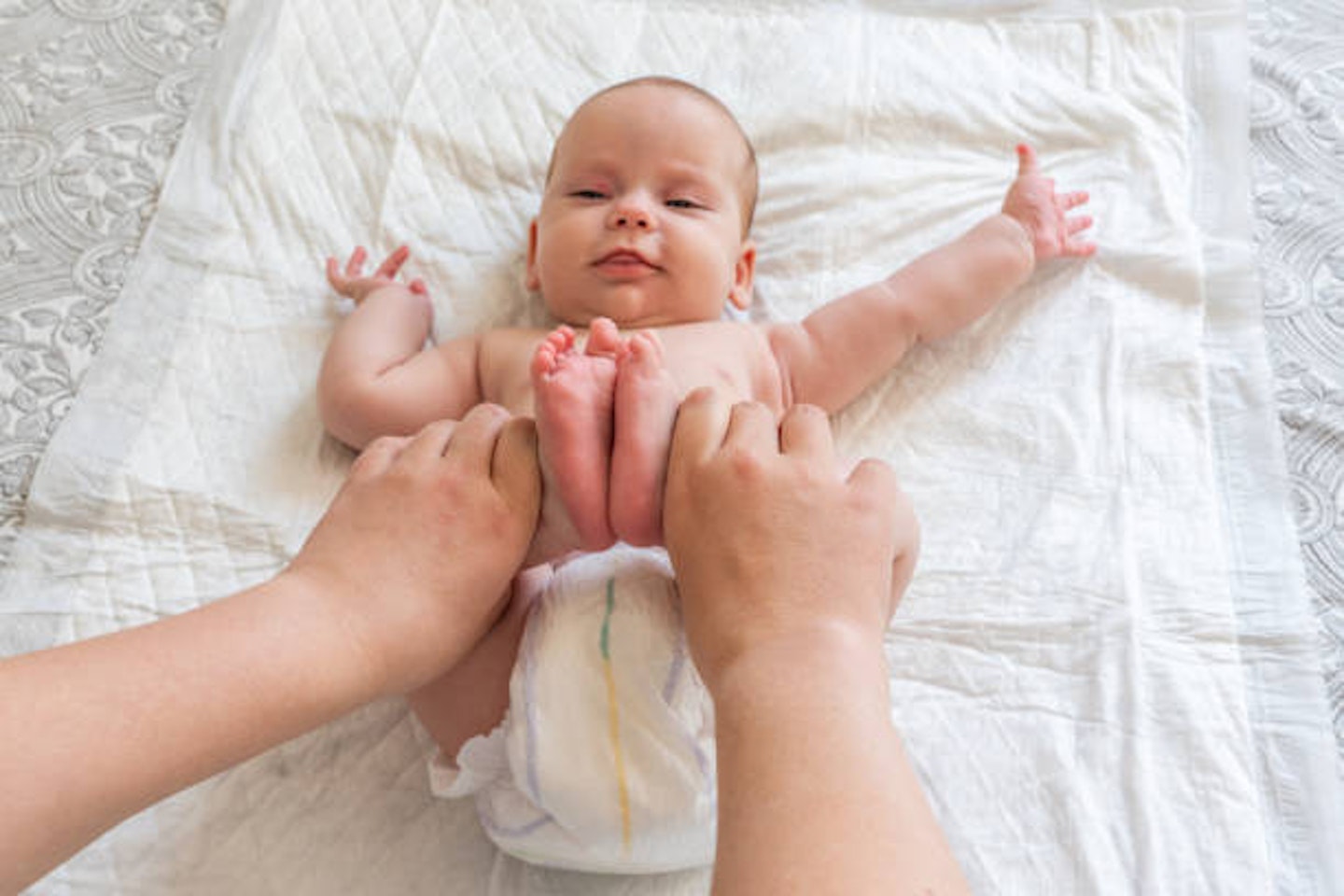This article has been medically reviewed by Lesley Gilchrist, BSc (Hons) Midwifery Studies, MSc Clinical Research Methods, and the CEO and founder of 'My Expert Midwife' Lesley has been a midwife since 2003, working in some of the largest teaching hospitals in Europe.
Throughout your baby’s development you’ll hear them make lots of unusual sounds and noises when they’re awake. Baby grunting in sleep is also common, as well as newborn grunting and squirming while sleeping. But one you may notice, which can sometimes cause concern, is your baby grunting like a little farm animal.
This is known as grunting baby syndrome and is completely normal, but if your baby's grunting tends to persist, it could also indicate that there's a problem. We spoke to Lesley Gilchrist, registered midwife and co-founder of My Expert Midwife, to find out.
What is grunting baby syndrome?
Grunting baby syndrome occurs when your infant is going (or trying) to have a poo.
Usually when we go for a poo we flex our stomach muscles while relaxing our pelvic floor, which applies pressure to help move stool through the gut. However, newborns don’t have strong enough stomach muscles to do this, so they use their diaphragm muscles to move their bowel instead. As your baby exercises the diaphragm it puts pressure on their voice box, which results in grunting.
Why is my baby grunting in sleep?
“Your baby may also make normal grunting noises during their sleep if they are passing gas or if they are constipated,” says Lesley. “They may also grunt after the very occasional breath, when they are dreaming, perhaps as an expression of discomfort or content; when they are stretching or sometimes, as they are falling asleep. Rarely, grunting in a baby may be due to a problem. However, issues such as reflux, infection, certain heart conditions and respiratory distress can cause your baby to grunt.”

What are the symptoms of grunting baby syndrome?
If your newborn has grunting baby syndrome they may experience the following:
• Grunting, crying or straining while trying to do a poo
• Their face may go red or even purple
• They may seem uncomfortable for a few minutes before having bowel movement
These symptoms can last for five to 10 minutes before your little one finally feels comfortable again.
Is grunting baby syndrome serious?
Grunting baby syndrome can cause your newborn some discomfort while they’re learning to coordinate these two new muscle groups, however it’s something we’ve all had to learn how to do.
When does baby grunting stop?
While you may find it hard to watch your little one go through this discomforting experience they will begin to stop grunting once they’ve learnt how to relax these two muscles, which is usually within a few months, so don’t panic.
How do you fix grunting baby syndrome?
“Most babies stop grunting when they are about three to four months old, or when their tummy muscles are strong enough to help with bowel movements," says Lesley. "Until then, they tend to engage their diaphragm when they strain, an action which puts pressure on their glottis (voicebox).”
However, if you’re concerned that your baby isn’t experiencing symptoms of grunting baby syndrome and that it may be something else, contact your GP.
For parents who would be interested in alternative methods, such as understanding and communicating your baby's elimination needs, you can read more about Elimination communication here.
When to seek medical attention
Although baby grunting noises are very normal, if your baby is grunting a lot it can also be a sign that there's a problem, so it's important to be able to differentiate between normal grunting noises and a grunting baby that may be unwell.
Lesley says in cases where baby grunting denotes a problem, their grunting will tend to persist (and not just happen when your baby is trying to have a poo or take a noisy breath') and be accompanied by the following signs and symptoms:
• A change in colour
• They seem distressed
• They have a high temperature
• Flaring their nostrils when they breathe in
• Other signs of laboured breathing may indicate more serious conditions like reflux, infection, RSV, or other respiratory issues — such as their chest/tummy ‘sucks in’ when they breathe in
"In such cases, or if you feel that there is something not right with your baby, always seek urgent medical advice,” says Lesley.
Other times your baby may grunt
If your newborn is grunting but they aren’t experiencing any of the symptoms above, the chances are they probably don’t have grunting baby syndrome and it could be something else.
1) Constipation
If baby is baby grunting and straining it may be that they are constipated. This is when bowel movements become less frequent, and your baby is finding it difficult to poo. It can be confused with grunting baby syndrome quite a lot, but if your baby has grunting baby syndrome, their poo will be soft. There's lots of ways you can help your baby's constipation.

2) Reflux
This is when your baby brings back up milk or is sick shortly after being fed, as the muscles at the base of their food pipe aren’t fully developed. It’s extremely common in babies before eight weeks old and can cause them to cry and potentially grunt.
Holding your baby during and after feeding for as long as possible can help prevent this, as well as making sure they sleep flat on their back. However, as your baby’s muscles develop, they should grow out of this.
3) Sepsis, meningitis or heart failure
These more severe conditions can cause newborn babies to grunt, but cases are very rare. If your baby is grunting, it's much more likely to be reflux, constipation or grunting baby syndrome. However, if you notice the grunting in addition to any of the following symptoms, contact your GP immediately.
Sepsis (blood poisoning) - Fever, blue tinge in the lips or tongue, breathlessness or breathing very fast, a weak high pitched cry (that's not like their normal cry), reduced urination, flopiness.
Meningitis (infection of the protective membranes that surround the brain and spinal cord) - have a high pitched cry, refuse feeds, be irritable, have a stiff body, be floppy or unresponsive, have a bulging soft spot on the top of their head, seizures, fever, vomiting, cold hands and feet.
Heart failure (when the heart is unable to pump blood round the body properly, usually when it's become to stiff or weak) - unable to gain weight, shortness of breath, falling asleep during feeds or too tierd to feed, coughing, irritable, excessive sweating after feeding, swelling in body parts.
About the expert
Lesley Gilchrist, BSc (Hons) Midwifery Studies, MSc Clinical Research Methods, is the CEO and founder of 'My Expert Midwife' and has been a midwife since 2003, working in some of the largest teaching hospitals in Europe. Through this time, Lesley has gained invaluable experience and insight into maternity care, labour and birth.
Having graduated from the University of Gloucestershire with a first in Journalism, Mother and Baby Digital Writer Bryony Firth-Bernard went on to work as a reporter at Heart Radio West before becoming the lifestyle intern across Good Housekeeping, Prima and Red magazine.
